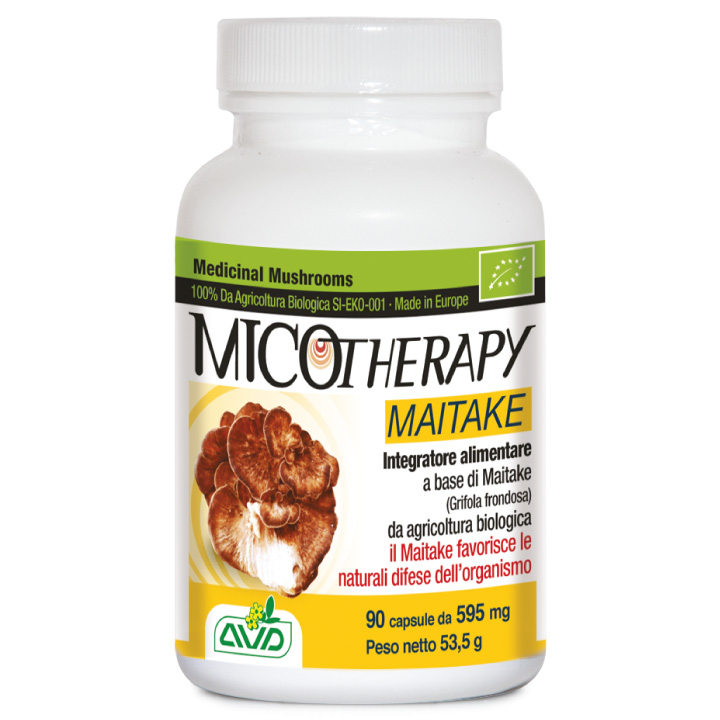
Complemento alimenticio a base de Maitake (Grifola frondosa) procedente de agricultura ecológica (IT BIO 006) – Hecho en Europa.
Propiedades:
También llamado «Rey de los hongos», Maitake se considera un tónico adaptógeno, útil para reequilibrar las funciones del cuerpo, aumentar la vitalidad y aumentar la respuesta inmune. Una serie de estudios ha resaltado la importancia de Maitake en el tratamiento de problemas metabólicos.
Efecto fisiológico:
Los numerosos estudios realizados desde la década de 1980 han demostrado que los polisacáridos contenidos en Maitake tienen una estructura particular y única que los hace muy potentes incluso cuando se administran por vía oral. Entre las diversas fracciones de polisacáridos aisladas, se evaluó la eficacia de la fracción D y la fracción X: la primera fue particularmente efectiva en el sistema inmune, la segunda a nivel metabólico. Estudios y observaciones más recientes han demostrado que todo el hongo (micelio y cuerpo fructífero) es más efectivo que el extracto a nivel metabólico y puede ser útil para controlar el aumento de peso y reequilibrar el perfil lipídico, al tiempo que respalda la función hepática.
Ingredientes:
Maitake (Grifola frondosa) de agricultura ecológica, hongos enteros
Dosis recomendada:
Una cápsula 3 veces al día, preferiblemente lejos de las comidas
Presentación:
Envase de 90 cápsulas
Conservación y Registro:
Conservar el producto en un lugar fresco y seco resguardado de la luz solar y de fuentes de calor
Código Nacional 196796.1
Libre de Gluten
Producto certificado de agricultura ecológica (IT BIO 006) – Hecho en Europa
| CONTENIDO MEDIO DE LOS INGREDIENTES CARACTERIZADORES | POR DOSIS DIARIA (3 CAP) |
| Maitake | 1500 mg |
Bibliografia:
- Jones K. Maitake, A potent medicinal food. Altern Complement Ther 1998; 4:420-9
- Namba H, Hamaguki A, Kuroda H. The chemical structure of an antitumor polysaccharide in fruit bodies of Grifola frondosa (Maitake) Chem.Pharm.Bull. Vol.34(3):1162-1168, 1987
- Namba H Antitumor activity of o rally administrated “D-fraction” from Maitake nushroom (Grifola frondosa). J.Naturopathic Med Vol.4(1):10-15; 1993
- Namba H. N. Maitake D-fraction and preventive potential for cancer. Journal of Orthomolecular Medicine Vol.12(1):43-49, 1997
- Kodama N, Asakawa A, Inui A. Enhancement of cytotoxicity of NK cells by D-Fraction, a polysaccharide from Grifola frondosa. Oncol Rep. 2005 Mar;13(3):497-502
- Harada N, Kodama N, Nanba H., Cancer Lett Relationship between dendritic cells and the D-fraction-induced Th-1 dominant response in BALB/c tumor-bearing mice. 2003 Mar 31;192(2):181-7
- Kreis W. Current chemotherapy and future directions in research for the treatment of advanced hormone-refractory prostrate cancer. Cancer Invest 1995; 13:296-312
- Finkelstein MP, Aynehchi S, Samadi AA, Drinis S, Choudhury MS, Tazaki H, Konno S. Chemosensitization of Carmustine with Maitake _-Glucan on Androgen- Independent Prostatic Cancer Cells: Involvement of Glyoxalase I. The Journal of Alternative and Complementary Medicine. 2002, 8(5): 573-580
- Yang D, Li S, Wang H. Prevention of postoperative recurrence of bladder cancer: a clinical study. Zhonghua Wai Ke Za Zhi. 1999 Aug;37(8):464-5)
- Yang DA, Li SQ, Li XT. Prophylactic effects of zhuling [Maitake] and BCG on postoperative recurrence of bladder cancer., General Hospital of Jinan Unit of People’s Liberation Army
- Fullerton SA et al. Induction of apoptosis in human prostatic cancer cells with [beta]-glucan (maitake mushroom polysaccharide). Mol Urol 2000; 4:7-11
- Kodama N, Komuta, Nanba H. Can Maitake MD-Fraction aid cancer patients? Alternative Medicine Review_Vol.7(3):236-239,2002
- Finkelstein MP, Aynehchi S, Samadi AA, Drinis S, Choudhury MS, Tazaki H, Konno S. Chemosensitization of carmustine with maitake beta-glucan on androgenindependent prostatic cancer cells: involvement of glyoxalase J Altern Complement Med. 2002 Oct;8(5):573-80. I
- Fukushima M, Ohashi T, Fujiwara Y, Sonoyama K, Nakano M. Cholesterol-Lowering Effects of Maitake (Grifola frondosa) Fiber, Shiitake (Lentinus edodes) Fiber, and Enokitake (Flammulina velutipes) Fiber in Rats. Experimental Biology and Medicine 226:758-765 (2001)
- Nishina A, Kimura H, Sekiguchi A, Fukumoto R, Nakajima S, Furukawa S. Lysophosphatidylethanolamine in Grifola frondosa as a neurotrophic activator via activation of MAPK J. Lipid Res. 2006. 47: 1434–1443
- Manohar V, Talpur NA, Echard BW, Lieberman S, Preuss HG. Effects of a water-soluble extract of maitake mushroom on circulating glucose/insulin concentration in KK mice. Diabetes, Obesity and Metabolism, 4, 2002 (43-48)
- Horio H, Ohtsuru M. Maitake (Grifola frondosa) improve glucose tolerance of experimental diabetic rats. J.Nutr.Sci.Vitaminol. 2001; 47: 57-63
- Kubo K, Namba H. Anti-diabetic mechanism of Maitake (Grifola frondosa). In: Royse DJ, ed. Mushroom Biology and Mushroom Products. University Park, PA: Penn State University; 1996:215-221
- Kubo K, Aoki H, Namba H. Anti-diabetic activity present in the fruit body of Grifola frondosa (Maitake). Biol.Pharm.Bull. 1994; 17(8): 1106-1110
- Kabir Y, Yamaguchi M, Kimura S. Effect of shiitake (Lentinus edodes) and maitake (Grifola frondosa) mushrooms on blood pressure and plasma lipids of spontaneously hypertensive rats. J Nutr Sci Vitaminol 1987;33:341-346
- Kabir Y, Kimura S. Dietary mushrooms reduce blood pressure in spontaneously hypertensive rats (SHR). J Nutr Sci Vitaminol 1989;35:91-94
- Kabir Y, Hoshino T, Komai M, Kimura S. Histopathological changes in spontaneously hypertensive rats after feeding shiitake (Lentinus edodes) and maitake (Grifola frondosa) mushroom diets. J Clin Biochem Nutr 1989;6:187-193
- Adachi K, Nanba H, Otsuka M, Kuroda H. Blood pressure-lowering activity present in the fruit body of Grifola frondosa (maitake):I. Chem Pharm Bull 1988;36:1000-1006
- Wu S, Zou D, Han SH, et al. Therapeutic effect of Grifola polysaccharides in chronic hepatitis B [abstract P-18]. In: International Symposium on Production and Products of Lentinus Mushroom, Programme and Abstract, Qingyuan, Zhejiang Province, China: International Society for Mushroom Science, Committee on Science, Asian Region, Qingyuan County Government, Zhejiang Province, China, 1994
- Kubo K, Nanba H. The effect of maitake mushrooms on liver and serum lipids. Altern Ther Health Med 1996;2:62-66
- Kubo K, Nanba H. Anti-hyperliposis effect of maitake fruit body (Grifola frondosa).I. Biol Pharm Bull 1997;20:781-785
- Okamura M. Distribution of ascorbic acid analogs and associated glycosides in mushrooms. J Nutr Sci Vitaminol 1994;40:81-94
- Ohtsuru M. Anti-obesity activity exhibited by orally administered powder of maitake mushroom (Grifola frondosa). Anshin July1992;198-200. [Article in Japanese]
- Yokota M. Observatory trial of anti-obesity activity of maitake mushroom (Grifola frondosa). Anshin July1992;202-203. [Article in Japanese]
- Miura N, Ohno N, Aketagawa J, et al. Blood clearance of (1—>3)-beta-D-glucan in MRL 1pr/1pr mice. FEMS Immunol Med Microbiol 1996;13:51-57
- Hobbs C. Grifola frondosa monograph. Santa Cruz, CA: Botanica Press; 1995:110-115
Para más información visite el sitio: www.micotherapy.it




